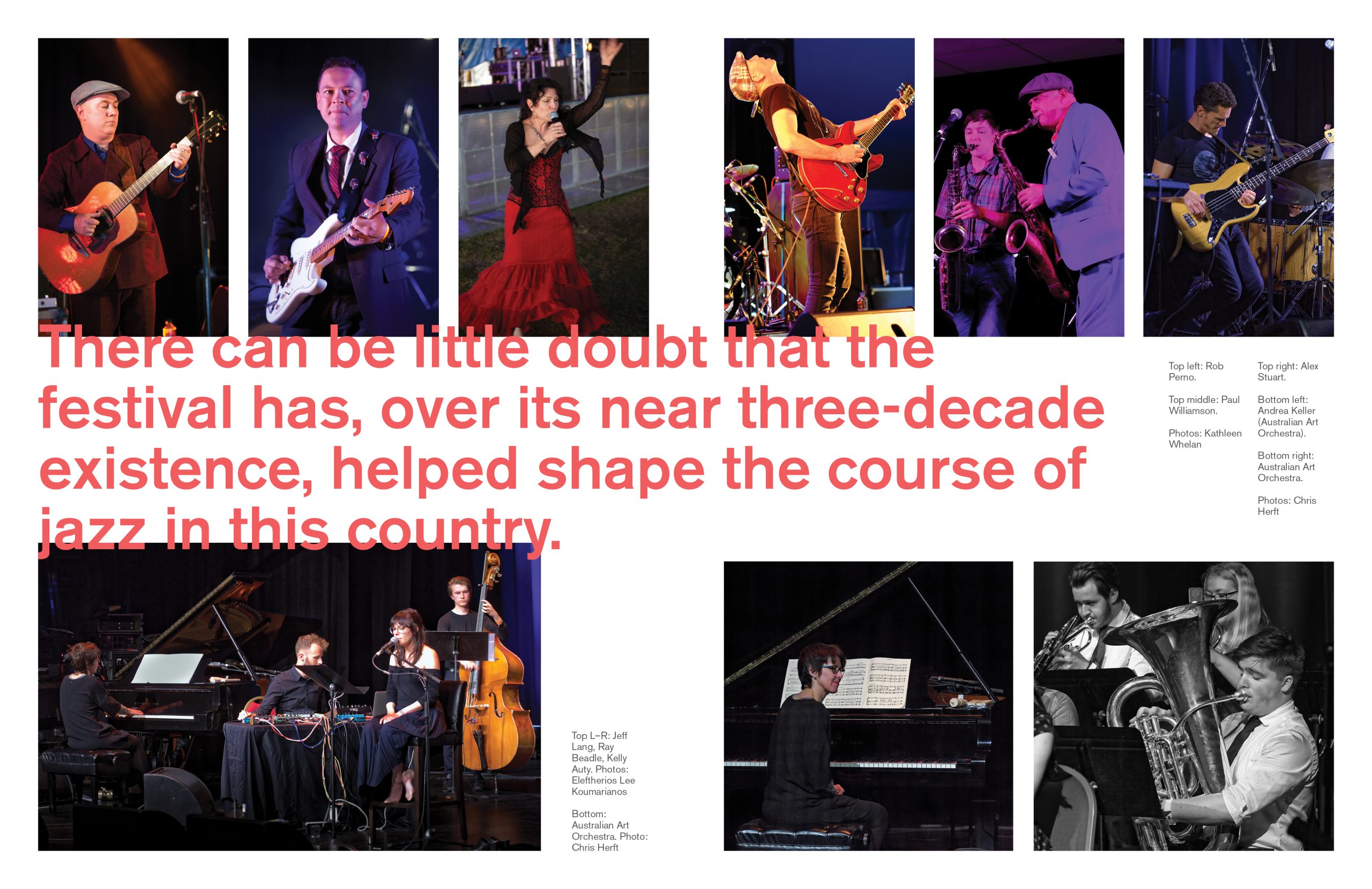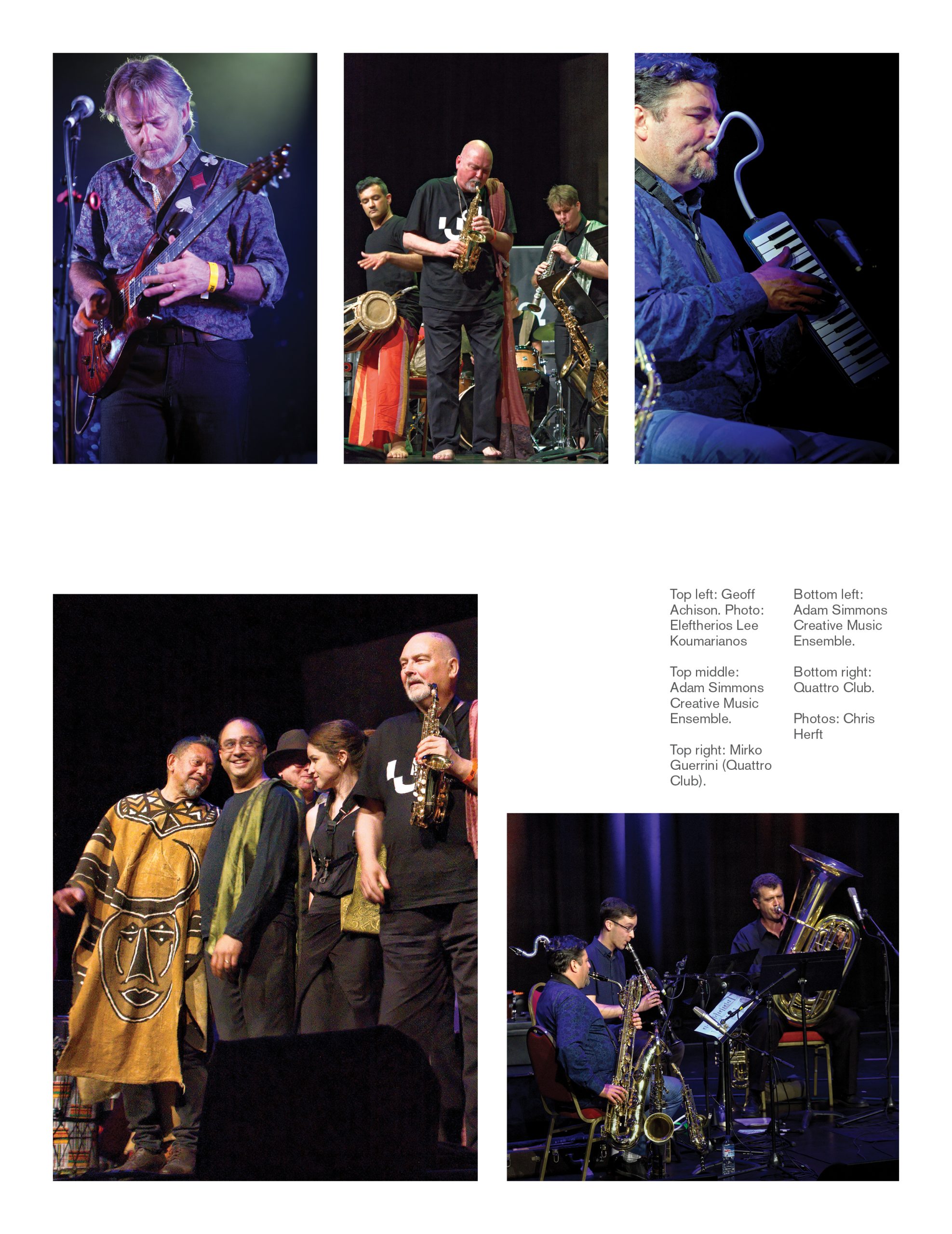This article was first published In Dingo Issue 3, April 2022.
Adrian Jackson & Andra Jackson
Melbourne Books

For regular pilgrims to Wangaratta’s annual celebration of jazz and blues, the photographs alone will trigger an avalanche of memories. Suddenly the music is swirling in your head again as you stare at singer Michelle Nicole and remember easing into a new day’s music with her quartet, or you see Steve Lacy’s face screwing up to hit a note on his ancient-looking soprano saxophone and remember his singular asceticism. There’s keyboards-master Joe Zawinul wearing a tea-cosy hat to keep a lid on a brain exploding with sonic ideas, while drummer John Pochée’s leonine head reactivates the glories and tragedies of Ten Part Invention.
Then you read the text (or even just the year-by-year list of players at the back), and other memories ambush you, like lazy, hazy Mondays at Brown Brothers, or guitarists John Scofield and James Muller sharing a stage in 2008. Many may remember brilliant bassist Mark Helias leading his trio with saxophonist Tony Malaby and drummer Gerald Cleaver in 2000, and then being joined by trumpeter Scott Tinkler, trombonist James Greening and saxophonist David Ades. That the latter went on to share recording projects with the three Americans is a tribute to the nous of the festival’s long-term artistic director, Adrian Jackson, in forging collaborations.
Jackson was perfectly placed to write this large-format overview of 30 years of Australia’s most important jazz festival (with help from his sister, Andra). His style is conversational, anecdotal, entertaining and self-deprecating. Sometimes he could have employed deeper analysis of exactly why a given act worked so well (or didn’t!), but that minor flaw is swept away by his ability to take us behind the scenes of the event’s first 26 iterations.

While the book is predominantly penned by Jackson, sidebars proliferate from musicians and others. Trumpeter Eugene Ball astutely observes that the festival’s success can partly be attributed to people leaving their daily environment and travelling to Wang (with its convenient combination of venues) specifically to devote themselves to the music. Pianist Matt McMahon notes that before Wang he’d only heard local jazz in clubs, never concert halls, and the festival helped change perspectives on the music’s importance. Journalist/photographer Roger Mitchell mentions the festival’s particular capacity to expose listeners to unfamiliar artists, and trumpeter Phil Slater takes that further, suggesting that the engaged and informed Wang audiences actually made certain types of music possible that otherwise might have been out of reach. Also incisive is singer/trumpeter Vince Jones’s reflection that Jackson’s purity of motives played an important part in upping the festival’s quality of art.
Many sidebars are reminiscences, including an entertaining beat-poet-like spray from saxophonist Wilbur Wilde and a heartfelt piece from singer Judy Jacques about jumping into the deep end of a jam session, goaded on by Jackson. The yarn about drummer Allan Browne having his prized new car head-butted by a goat is hilarious, as is Pochée’s quip that when his trio, The Engine Room, accompanied the National Jazz Awards participants two years in a row, it was the only time in his long career that the billing said, “Back by popular demand”! Saxophonist Zac Hurren also tells a priceless story of a boozy afternoon with the great Bernie McGann.
Among Jackson’s own anecdotes, many of the best relate to handling recalcitrant musicians (drummer Alan Turnbull, pianist Eric Reed and band leader Willem Breuker among them) and sudden catastrophes (including having the entire ICP Orchestra delayed in Beijing, with Jackson calmly shuffling his program accordingly). There are also marvellous stories of a dinner Jackson hosted for the bands of Zawinul and Helias, where Zawinul’s accounts of days of yore had everyone spellbound, and of driving Steve Lacy to Wang in 1994 and astounding him by playing Charles Munro’s brilliant 1967 local album Eastern Horizons on the way. Especially moving is his account of Ten Part Invention’s scorching set of pianist Roger Frampton’s compositions in 1999, which Frampton (and everyone else) knew would be his last concert with the band before his death from an inoperable brain tumour.
Andra Jackson’s contributions add colour and breadth to the picture her brother paints, and his own recounting of being axed by the board in 2016 still puts a lump in the throat. While the festival continued (and Jackson continues the story), it soon ran into the pandemic, and its ongoing viability remains to be seen. But any Wang fan will lap up this testament to its first 30 years.
John Shand
You can purchase Wangaratta Festival of Jazz & Blues 30 years on our website.

